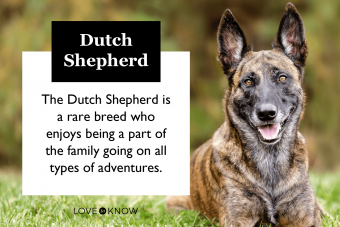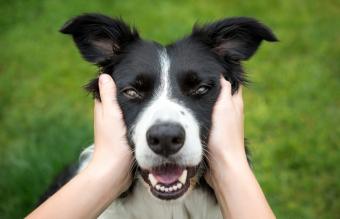
The Dutch Shepherd is often confused with the German Shepherd, but they are two distinct breeds. Similar to German Shepherds, they do like to run, jump, and play. If you're searching for a dog that enjoys exercising, going hiking, and becomes your best friend, this could be the breed for you.
Origin and History
The Dutch Shepherd was developed to be a shepherd's working dog, taking on a range of tasks, including herding, pulling carts, and guarding property. Originally, they weren't much different from their German Shepherd and Belgian Shepherd cousins. Over the past century, they have developed their own set of breed standards and have become notably different. They also tend to be more difficult to find than their shepherd counterparts.
As farming became less prevalent, Dutch Shepherds were no longer considered a necessity and their numbers declined. Many of them died of starvation, and those that didn't were taken by the German military in World War II. After the war was over, breeders attempted to re-establish the breed by interbreeding them with other mixed breeds.
The Dutch Shepherd is still rare today, but due to their highly trainable nature, they are utilized in some military operations, the police force, in search and rescue, and as guide dogs for the blind. They're also known to compete in dog sports and continue to be useful on farms.
Breed Characteristics

The Dutch Shepherd is a rare breed, but if you're ready to do some searching, they could be exactly what you're searching for.
General Appearance
Short hair, wire hair (also known as rough hair), and long hair are the three coat types of the Dutch Shepherd. The undercoat of the short hair is fluffy. Wirehair possesses a dense, coarse undercoat and a fuzzy undercoat. The long, straight hair is a little rough to the touch. The coats are designed to ensure a variety of weather conditions.
Male Dutch Shepherds are slightly larger than females, standing 22 to 25 inches tall at the shoulder on average, while females are roughly 21 to 24 inches tall. The breed typically reaches a weight of 50 to 70 pounds.
Temperament
The Dutch Shepherd is incredibly loyal and eager to please. They enjoy being alongside their companion or family and will happily go on any adventure you bring them on. They are active dogs, but don't mind lounging on the couch for a movie when their exercise needs are met.
They have a strong desire to have a purpose and will need a job to do each day. Once they feel their work is done, they will want to relax and recharge. Their intelligence level combined with their affectionate personality makes them an excellent companion for someone on the go during the day and ready to relax in the evenings.
If you live a more sedentary lifestyle or if you plan to leave them at home for long periods of time, this isn't likely the breed for you. The Dutch Shepherd develops separation anxiety and may become destructive if they aren't provided enough attention.
They make excellent guard dogs. They don't prefer to be aggressive, but will fiercely guard their family if they believe they're in trouble. Due to this trait, they tend to be wary of strangers at first, but once someone starts coming around enough, they will learn who is and isn't permitted within their territory.
Training
The Dutch Shepherd is a very trainable dog with a strong desire to please their owner. They pick up new commands and tricks quickly. This breed needs a self-assured trainer who can establish limits, keep dogs engaged in learning, and establish a trusting relationship and strong bond. Early socialization training is vital for them to remain calm with new people, animals, and places.
Exercise Requirements

The Dutch Shepherd requires a minimum of one hour of exercise each day, but two hours is recommended for most dogs of this breed. You can take them for a walk or a jog, play some games, or take them swimming. They will happily join in on anything mentally or physically stimulating.
If you're going to be gone longer than expected, providing them with a puzzle toy to keep their mind busy is highly recommended.
Health
In general, Dutch Shepherds are a relatively healthy breed. There are isolated cases of hip dysplasia in Dutch Shepherds. However, this condition is far less common than it is in related breeds like German Shepherds.
- Hip and elbow dysplasia: Hip dysplasia is a genetic condition where the femur doesn't fit properly into the pelvic socket. This can lead to lameness in the back legs and pain. Similarly, elbow dysplasia involves the bones in the elbow joints not fitting together correctly.
- Gastric torsion: Commonly known as bloat, this condition affects deep-chested and large dogs, generally occurring when they drink or eat too quickly. This condition can be life-threatening and requires immediate medical attention.
- Degenerative myelopathy: A genetic disease that affects the spinal cord, leading to weakness and possibly paralysis in the hind limbs.
Lifespan
The Dutch Shepherd has a relatively long life span ranging from 13 to 15 years.
Grooming
Both short and long-haired coats require brushing on a regular basis to remove dead hairs, particularly from the undercoat. The wire-haired coat should be groomed twice a year by a professional and should not be brushed, but can be combed occasionally. Bathing Dutch Shepherds should only be done when absolutely necessary, as it eliminates the skin's natural oils. Check their ears and trim their claws as necessary, typically once every two to four weeks.
Fun Facts About the Breed

The general public doesn't know much about the Dutch Shepherd in most cases, so most of what you discover is likely new. There are some interesting facts you may not know though, even if you are a Dutch Shepherd enthusiast, including:
- They can run up to 32 miles per hour.
- The Dutch Shepherd almost went extinct in the 1950s.
- They work as police dogs.
- Every Dutch Shepherd is brindle.
Purchasing or Adopting a Dutch Shepherd
If you're looking for a Dutch Shepherd puppy, a good place to start is the Dutch Shepherd Club of America. It has a breeder directory available as well as helpful tips on how to find responsible breeders with quality dogs. The AKC Marketplace also has a breeder search. Expect to pay around $1,000 to $2,500, although higher-end, trained dogs from champion lines can cost as much as $20,000.
Rescue Organizations
If you would prefer a rescue dog, begin searching Save-a-Rescue and PetFinder. You can also contact these breed-specific Dutch Shepherd rescue organizations:
- North American Dutch Shepherd Rescue: A national rescue organization dedicated to rescuing, fostering, and re-homing Dutch Shepherds.
- Malinois and Dutch Shepherd Rescue: A nonprofit organization specializing in the Malinois and Dutch Shepherd rescuing and rehoming as needed.
Is this the Right Breed for You?
If you're searching for a loyal companion to stay by your side on a regular basis, this could be the breed for you. On the other hand, if you aren't going to be home for long periods of time throughout the day, this breed could become destructive and depressed. They need continuous companionship, which is why they make such excellent police, military, and guide dogs. If you know you aren't going to have much time throughout the day to bond and keep them busy, you may want to look into another breed.







